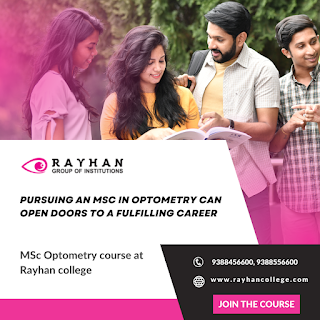MSC Optometry - Qualification, Scope, and Duration
MSC Optometry - Qualification, Scope, and Duration
Optometry, the branch of healthcare dedicated to vision care, has been rapidly evolving, offering numerous opportunities for those interested in pursuing a career in eye health. Among the various educational pathways available, a Master of Science (MSc) in Optometry stands out as a comprehensive program designed to equip students with the necessary knowledge and skills to excel in this field.
Qualification:
An MSc in Optometry is typically a postgraduate degree program aimed at individuals who have completed their undergraduate studies in a related field such as biology, chemistry, or pre-optometry. The program provides advanced education and training in optometry, including specialized coursework in ocular anatomy, physiology, pathology, optics, and clinical skills.
To qualify for admission into an MSc Optometry program, candidates are usually required to have a bachelor's degree with a strong background in science, along with meeting specific GPA and entrance exam score requirements. Additionally, some programs may require applicants to have relevant work experience or letters of recommendation.
Scope:
The scope of an MSc in Optometry is vast and varied, offering graduates numerous career opportunities in both clinical and non-clinical settings. Upon completion of the program, optometry graduates may choose to pursue careers as:
1. Optometrists: Graduates can become licensed optometrists, providing primary eye care services such as vision testing, prescribing corrective lenses, diagnosing eye diseases, and managing conditions like glaucoma and cataracts.
2. Specialists: Some optometry graduates may choose to specialize in areas such as pediatric optometry, low vision rehabilitation, contact lenses, or ocular disease management, further expan8/ding their scope of practice and expertise.
3. Educators: With additional training or experience, optometry graduates may pursue opportunities in academia as professors or instructors, teaching aspiring optometrists or conducting research in the field.
4. Industry Professionals: Graduates may also find employment in the optical industry, working for companies involved in the manufacturing, distribution, or sales of eyewear, contact lenses, or ophthalmic equipment.
5. Public Health Advocates: Optometry graduates can contribute to public health initiatives by participating in community outreach programs, raising awareness about eye health issues, and promoting preventive care strategies.
Duration:
The duration of an MSc in Optometry program typically ranges from two to three years, depending on the institution and the specific curriculum requirements. In some cases, students may have the option to pursue the degree on a full-time or part-time basis, allowing for greater flexibility to accommodate other commitments such as work or family responsibilities.
During the course of their studies, students can expect to engage in a combination of didactic coursework, laboratory sessions, clinical rotations, and research projects, providing a well-rounded education and practical experience in the field of optometry.
In conclusion, pursuing an MSc in Optometry courses in Kerala can open doors to a rewarding and fulfilling career in eye care. With a solid foundation in scientific principles and clinical skills, graduates are well-prepared to make a meaningful impact on the lives of individuals and communities by preserving and enhancing vision health. Whether as primary care providers, specialists, educators, or industry professionals, optometry graduates play a vital role in promoting eye health and improving the quality of life for people around the world.
.png)



Comments
Post a Comment